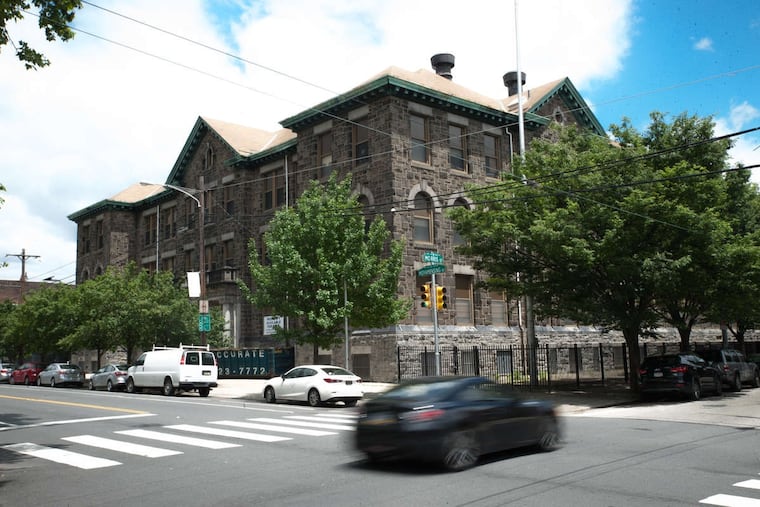Six Philadelphia real estate projects awarded historic tax credits by state agency
Two former Philadelphia schools, a vacant brewery, a library, a Center City high-rise, and a commercial row building were awarded the tax credits, which total $600,000.

Six Philadelphia properties have been awarded state historic tax credits, the Wolf administration announced this week, providing a total of $600,000 in financial benefits to the real estate teams who are redeveloping local historic buildings.
The tax credit awards, administered by the state’s Department of Community and Economic Development and the Pennsylvania Historical and Museum Commission, came after 42 applicants had sought nearly $15 million for the fiscal 2018-19 year. Twenty-four applicants were selected, totaling $3 million in credits, including one project in Chester County. The remaining selected projects were outside the Philadelphia region.
Established in 2012, Pennsylvania’s historic tax credit program provides a total of $3 million annually to developers who rehabilitate properties that are listed on the National Register of Historic Places. That register, unlike Philadelphia’s local register, does not protect buildings from demolition, but instead provides developers access to financial incentives, including tax credits, which can be used to offset the tax liability of the person or entity that received the credit. Projects that receive state historic tax credits also are eligible to receive national historic tax credits.
Pennsylvania’s program is designed to award credits evenly across the state, and allocations are determined based on a competitive process that evaluates a project’s community and economic impact, said a spokesperson for the Department of Community and Economic Development. No project can receive more than $500,000 in state credits.
For years, the program’s annual cap of $3 million has been criticized as being too small to incentivize large preservation projects — a view that was reinforced earlier this year in a report by the state’s Independent Fiscal Office, the agency tasked with reviewing tax-credit programs. That report found that the awards would benefit from “quicker turnaround, more transparency and predictability.” The agency recommended increasing the aggregate dollar cap beyond $3 million.
The Pennsylvania program is expected to expire in 2020, though, The Inquirer reported earlier this year, lawmakers have responded with bills to extend the program’s life and raise the cap on credits.
Here are the local projects that received awards
Abigail Vare School, 1619 E. Moyamensing Ave., received a $100,000 tax credit allocation for its development team’s proposal to convert the shuttered Philadelphia public school into 42 market-rate apartments. That project, which the state said cost around $5.5 million, was completed by the Maryland-based Concordia Group, in partnership with the How Group, the leasing manager that also served as the general contractor for the property, said Devin Tuohey, a principal at Concordia. According to Tuohey, the property is fully leased.
Charles Schaeffer School, 4701 Germantown Ave., received $25,000 for its development team’s proposal to convert the historic former school, which dates to 1876, into coworking and office space. That project, which the state said cost roughly $1.5 million to redevelop, was completed by Mount Airy-based developer Ken Weinstein, as part of his $12 million Wayne Junction revitalization project. Weinstein said the first two floors of the stone building would house coworking space, while the third floor would provide expanded space for Philly Office Retail, Weinstein’s development company. His company is expected to move into the building next week.
Poth Brewery, 1500-36 N. 31st St., received $200,000 for its development team’s proposal to redevelop the former brewery in Philadelphia’s Brewerytown neighborhood into market-rate apartments. That project, which the state said is expected to cost roughly $37 million, is being completed by MMPartners, a Philadelphia-based developer with a large presence in Brewerytown. According to the developer’s website, the plan will create roughly 130 apartments, 25,000 square feet of commercial space, and tenant amenities. It is expected to open in January.
The West Philadelphia Institute, 22-26 S. 40th St., received $100,000 for the proposal to develop the former library designed by prominent architect Frank Furness into offices. The estimated construction cost is nearly $5 million. The Inquirer reported last year that the three-story building, which was designed in the 1870s, is being redeveloped by U3 Ventures, a Philadelphia company, which said at the time that it planned to fill the building with office and retail tenants.
The Witherspoon Building, 1319-1323 Walnut St., received $150,000 for plans to redevelop the Center City office building, which is owned by SSH Real Estate. The Inquirer reported earlier this year that SSH will build out the 165,000-square-foot building with 186 apartments, which will be operated and managed by Sonder Corp., a San Francisco-based hospitality venture. The state said the project was estimated to cost $8 million and aims to begin booking for short-term stays by spring 2020.
257 N. Third St., Old City, received $25,000 for the proposal to develop the rowhouse into commercial use and apartments. According to the state, the project is expected to cost roughly $1 million. The Inquirer reported earlier this year that Sonder Corp. plans to operate seven apartments in the building, which Philadelphia-based owner Civetta Property Group is rehabilitating.
The Spence Building, downtown West Chester, Chester County, received $75,000 for a $2 million redevelopment project that will rehabilitate the historic restaurant and apartment building into commercial use and market-rate apartments.